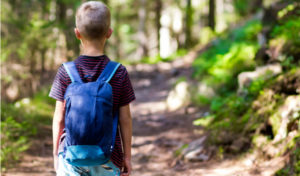As I wrote to you yesterday in Part I, my nephew is on a week-long camping trip called Survival with his seventh grade class from Old Rochester Junior High School—the tri-town regional junior high school for kids from the towns of Mattapoisett (where I’m from), Rochester, and Marion, Massachusetts. I remember like it was yesterday boarding the yellow school bus and driving several hours not knowing where we were going, but seeing fewer and fewer houses and then no houses, and realizing we were a long way from home.
When the bus stopped we lined up at the base of a rural dirt road and found our back-pack and milk crate (full of food) lined-up, off to the side, ready for us to carry to the top of the hill where base camp was located three miles up. If you’ve ever carried a milk crate full of anything, then you know it’s almost impossible to adjust the thing to where it feels comfortable. And I’m talking about walking from the garage to the car. Now, imagine you have a 30 pound pack on your back, it’s about 85 degrees out, you’re in seventh grade, and then you pick up this crate full of food that needs to be your sustenance for the next several days when you’re not out on the “Survival” part of the trip. And that’s when you start wondering if you really need that can of Dinty Moore Beef Stew.
One of my favorite memories from Survival, not including my time as a student in seventh grade, were the years I served as a counselor from eighth through twelfth grade. As a seventh grader Survival is at times an excruciating experience where you really don’t know what’s around the corner: Where is base camp? What is the Notch (I’ll tell you in another post)? When will we go on the “Survival” part of the trip? That was the beauty of “Survival.” You did not know the answers.
But, as a counselor you had the answers. You knew what to expect. But your job was to guide the kids—not do the work for them. Because the greatest gift of Survival was the feeling of accomplishment at the end of the week when you “Survived” on your own and with your classmates. And I was always impressed by how kids stepped up to the challenge from the minute they walked off the bus.
Stepping off the yellow-bus, seeing their backpack, milk crate and feeling like going back home, the first steps were always the hardest. On that first hike up to base camp, there were times where they wanted to give up. Then, just as they felt they couldn’t make another step, a classmate they may have never talked to at school, would be jogging back down the road to help them carry that “damn” milk crate the last few hundred yards. And that’s how a week of Survival began—Surviving with classmates, a long way from home.
Click to read parts I and III.
E.J. Smith - Your Survival Guy
Latest posts by E.J. Smith - Your Survival Guy (see all)
- “What Do You Do If the Market Crashes?” - April 19, 2024
- Costco Gold Bars Sell Out Despite Premium Price - April 19, 2024
- A Wise Man’s Take on the Boston Bruins Playoff Chances - April 19, 2024
- Is Your Retirement Life a Mess? Let’s Talk - April 18, 2024
- Your Survival Guy Learns from Marie Kondo - April 18, 2024















